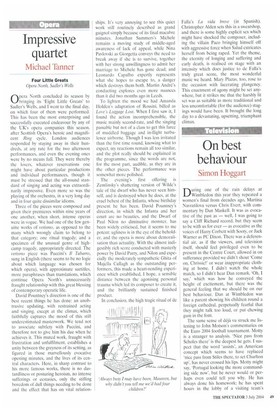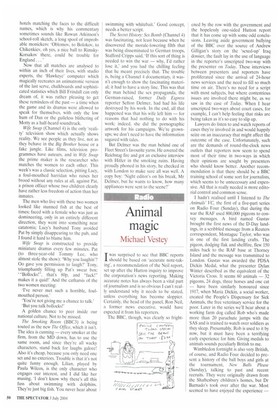On best behaviour
Simon Hoggart
During one of the rain delays at Wimbledon this year they repeated a women's final from decades ago, Martina Navratilova versus Chris Evert, with commentary by Dan Maskell. It was as evocative of the past as — well, I was going to say a Cliff Richard record, but they seem to be with us for ever — as evocative as the voices of Harry Corbett with Sooty, or Jack Warner as PC Dixon. There was a deferential air, as if the viewers, and television itself, should feel privileged even to be present in the Centre Court, allowed in on sufferance provided we didn't shout 'Come on, Chrissie!' or wear inappropriate clothing at home. I didn't watch the whole match, so I didn't hear Dan remark, 'Oh, I say,' which was how he conveyed the height of excitement, but there was the general feeling that we should be on our best behaviour. Dan at Wimbledon was like a parent showing his children round a foreign cathedral, perpetually fearful that they might talk too loud, or put chewing gum in the font.
The same sense of déjà vu struck me listening to John Motson's commentaries on the Euro 2004 football tournament. Motty is a stranger to analysis. 'Nice pass from Scholes there' is the deepest he gets. I suspect that the word 'assists', an American concept which seems to have replaced 'nice pass from Stiles there, to set Charlton up', has never crossed his lips. Motty might say, 'Portugal looking the more commanding side now', but he never would or perhaps even could tell you why. He has always done his homework; he has spent hours in the lobby of a visiting team's
hotels matching the faces to the difficult names, which is why his commentary sometimes sounds like Rowan Atkinson's school-roll sketch, a long spool of improbable monickers: `Oblomov, to Bolokov, to Chikenkiev, oh yes, a nice ball to RimskyKorsakov there, could be trouble for England ... '
Now that all matches are analysed to within an inch of their lives, with studio experts, the Ilawkeye' computer which magically recreates an animatronic version of the last serve, chalkboards and sophisticated statistics which Bill Frindall can only dream of, it was rather pleasing to get these reminders of the past — a time when the game and its dramas were allowed to speak for themselves, with only the low hum of Dan or the guileless blithering of Molly as a half-heard soundtrack.
Wife Swap (Channel 4) is the only 'reality' television show which actually shows reality. We see people as they live, not as they behave in the Big Brother house or a fake jungle. Like films, television programmes have auteurs, and in Wife Swap the prime maker is the researcher who matches the women to each other. This week's was a classic selection, pitting Lucy, a foul-mouthed harridan who raises her brood without any rules at all, against Pat, a prison officer whose two children clearly have rather less freedom of action than her inmates.
The men who live with these two women looked like stunned fish at the best of times; faced with a female who was just as domineering, only in an entirely different direction, they went into something near catatonia; Lucy's husband Tony avoided Pat by simply disappearing to the pub, and I found it hard to blame him.
Wife Swap is constructed to provide miniature dramas every few minutes. Pat (to three-year-old Tommy Lee, who almost stole the show): 'Why you laughin'? Oo gave you permission to laugh?' Tony, triumphantly filling up Pat's swear box: —Bollocks!", that's 80p, and "fuck!" makes it a quid!' And the catharsis of the two women meeting:
'I've never met such a horrible, foulmouthed person.'
'You're not giving me a chance to talk.' 'But you talk bollocks!'
A golden chance to peer inside our national culture. Not to be missed.
The Smoking Room (BBC3) is being touted as the new The Office, which it isn't. The idea is cunning — every smoker at the firm, from the MD down, has to use the same room, and since they're all wacky characters, stand back for laughs galore! Also it's cheap, because you only need one set and no exteriors. Trouble is that it's not quite funny enough. Lilian, played by Paula Wilcox, is the only character who engages our interest, and I did like her musing, 'I don't know why there's all this fuss about swimming with dolphins. They're just big fish. You never hear about swimming with whitebait.' Good concept, needs a better script.
The Secret History: Sex Bomb (Channel 4) was fascinating, not least because when he discovered the morale-lowering filth that was being disseminated to German troops, Stafford Cripps said, 'If this sort of thing is needed to win the war — why, I'd rather lose it,' and you had the chilling feeling that he meant precisely that. The trouble is, being a Channel 4 documentary, it wasn't enough to show the fascinating material; it had to have a story line. This was that the man behind the sex propaganda, the German-raised, former Daily Express reporter Sefton Delmer, had had his life destroyed by his work. In the end, all that happened was that his wife left him — for reasons that had nothing to do with his work; indeed, she did the pornographic artwork for his campaigns. We're grownups; we don't need to have the information sugared with tales.
But Delmer was the man behind one of Fleet Street's favourite yarns. He covered the Reichstag fire and got an exclusive interview with Hitler in the smoking ruins. Having proudly phoned in his story, he checked in with London to make sure all was well. A copy boy: 'Night editor's on his break, Mr Delmer, but he wants to know, how many appliances were sent to the scene?'



































































 Previous page
Previous page